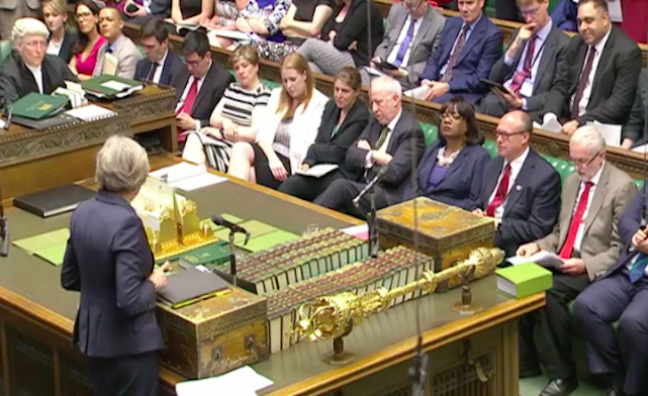As the election on 8 June draws ever closer, the question looms as to how the parties and candidates intend to help support the music industry’s £4.1 billion economic contribution. With political parties now revealing their hands, Music Week asked UK Music’s director of government and public affairs, Tom Kiehl, to examine their respective pitches to the public to find out what could be in store for the music industry in the next Parliament.
Conservatives
“‘Forward, Together’ sets up the party as offering the strong and stable government needed to get the best deal from Brexit. The manifesto is structured around the Conservatives having the policies to answer five challenges: 1, the need for a strong economy; 2, Brexit and a changing world; 3, enduing social diversions; 4, an ageing society and 5, a fast-changing economy. The manifesto would continue the Government’s existing work to shape a modern industrial strategy, highlighting the creative industries as a world-beating sector and building on that success. There is also a commitment to ensure the arts thrive beyond London and the introduction of a cultural investment fund to turn around communities.
“In an extensive digital section, the Conservatives pledge to introduce a charter to ensure protections and freedoms for users, businesses and platforms. This is supported by an unequivocal statement that they would be prepared to regulate the internet to ensure businesses abide by fair rules online. The charter would ensure content providers follow certain principles and regulators would have powers to fine or prosecute if legal duties are breached and even order the removal of content. Separately, there is a commitment to ensure content creators are appropriately rewarded for content available online.
“Further support is offered to creative industries, including building on existing favourable tax credits. Potentially this is an opportunity to implement UK Music’s call for fiscal incentives for the sector. The Conservatives also support UK Music’s appeal for a robust system of protection for IP when the UK leaves the EU, with strong protections against infringement."
Labour
“Within ‘For The Many, Not The Few’ the Labour Party sets out its vision for the country. The manifesto kicks off with a number of measures it believes will create an economy working for all, suggesting only Labour can build a credible industrial strategy. On Brexit, Labour would immediately guarantee existing rights for all EU nationals living in the UK with reciprocal rights for UK citizens living in the EU. There are many freelancers and self-employed workers in the music industry which has led to UK Music calling for shared parental pay to be extended to all employees. The Labour Party takes forward this policy in their manifesto.
“The document contains a section on “culture for all”, with a pledge to put the creative sector at the heart of Brexit negotiations and industrial strategy. There is a commitment to introduce a £1 billion Cultural Capital Fund to upgrade infrastructure and invest in creative clusters. On education, Labour will introduce an arts pupil premium in every school and review the EBacc to ensure the arts are not sidelined. A creative careers campaign in schools would also be launched.
“Addressing music specifically, the manifesto recognises the 'value gap' between producers of content and digital services, and the need to work with all sides to review the way artists are rewarded in the digital age. The plight of music venues is also highlighted with commitments to extend the pub business rate-relief scheme to music venues and introduce an agent of change principle.”
Liberal Democrats
“'Change Britain’s Future' commits the party to a referendum on the Brexit deal with an option to stay in the EU. Protecting support for the UK creative and tourism industries is identified as a priority for fighting a hard Brexit. Specific commitments include ongoing support for the Creative Industries Council, industry-tailored tax support and modern and flexible copyright and licensing rules. Additionally, addressing barriers to finance creative businesses and promoting creative skills are night on the agenda.
“Again, there is a specific culture section to the manifesto, with proposals for creative enterprise zones, protect intellectual property and examine available funding and planning rules for live music venues and grassroots music sector to prevent further closures.”
Conclusion
“While manifestos from the Green Party and SNP are still to be published, it is already clear the creative industries are being treated with great importance. Issues facing the music industry are being addressed and will be a critical part of political debate over the course of the next Parliament. The past two years have seen progress on a number of music industry issues, most recently with amendments to the law on secondary ticketing and copyright infringement in the Digital Economy Act. Rest assured, UK Music will be at the forefront of further developments at this pivotal time. And don’t forget, today is the deadline to register your vote for the General Election.”
UK Music are certainly not alone in commenting on the possible outcomes of the election. Geoff Taylor, chief executive, BPI, has also voiced his thoughts on the Conservative and Labour manifestos.
"The BPI strongly welcomes the commitment in both the Conservative and Labour manifestos to ensure sustainable business models and a level playing field for the creative industries,” said Taylor. “The ‘Value Gap’ – certain online platforms exploiting a lack of clarity in copyright law to avoid paying fairly for content – has acted as a significant brake on the growth of the digital music business. Action is required at both EU and UK level to correct this distortion and to allow creators to share fairly in all the opportunities of digital connectivity.”
Taylor continued: “We also strongly support the commitment in the Conservative manifesto to a new regulatory framework for digital companies, social media platforms and content providers, to ensure that they behave with the same responsibility that is expected from businesses in the offline environment and protect consumers from illegal and harmful content."











